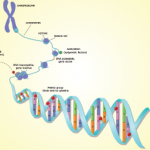Zhijian “James” Chen, PhD, Receives Lupus Research Institute Distinguished Innovator Award

Zhijian “James” Chen, PhD, a professor at the University of Texas, Southwestern Medical Center, Dallas, is a recipient of the Lupus Research Institute (LRI) 2014 Distinguished Innovator Award to support major studies that can advance the search for prevention, treatment and a cure.
Dr. Chen has discovered an essential new process that alerts the immune system to viruses by sensing the presence of foreign DNA within cells. When cells die, but don’t clear and aren’t properly disposed of by the body, DNA ends up in the cytoplasm, where it is seen as foreign DNA.
Dr. Chen’s research team identified a sensor of innate immunity called cGAS (the enzyme cyclic GMP-AMP synthase) that, after detecting and binding to the DNA it sees as a threat, catalyzed a compound called cGAMP (cyclic GMP-AMP). The cGAMP, which had never been seen in humans before, binds to an adaptor protein called STING. A cell-signaling cascade then produces interferons and cytokines: agents of inflammation.
“Normally this pathway is important for immune defense against infections by microbial pathogens. However, when the immune system turns against host DNA, it can cause autoimmune diseases,” Dr. Chen says. “Our discovery of cGAS as the DNA sensor provides an attractive target for the development of new drugs that might treat autoimmune diseases.”
John J. O’Shea, MD, Elected to the Institute of Medicine

John J. O’Shea, MD, scientific director of the NIH’s National Institute of Arthritis and Musculoskeletal and Skin Diseases (NIAMS), has been elected to membership in the Institute of Medicine (IOM) of the National Academy of Sciences.
Dr. O’Shea has been a physician and immunologist at NIH for 33 years, where he has made fundamental discoveries related to the signaling of cytokines, molecules critical to the development and functioning of the immune system. His discovery of Janus kinase 3 (Jak3) led to Pfizer developing tofacitinib, the first FDA-approved kinase inhibitor in rheumatic diseases therapy.
“It is a great honor to be recognized by your peers. It is one of the highest honors,” says Dr. O’Shea.
“John is a remarkable example of a clinician-scientist who has advanced the field of immunology by translating his discoveries into approaches that improve human health,” says NIAMS Director Stephen I. Katz, MD, PhD. “These discoveries are likely to benefit patients for years to come.”
Dr. O’Shea says one of the goals of the Institute of Medicine is “to advise the nation regarding healthcare by providing [medical] recommendations to the American people.”



